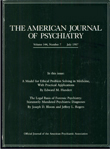Dr. Strasburger and Colleagues Reply
TO THE EDITOR: We thank the letter writers for their interest in our article. Since dialogue with Dr. Bursztajn shaped our thoughts, we agree with his points about the risk of contamination of the forensic interview and the value of forensic consultation.
Second, while Dr. Pearlman takes issue with a number of our points, we would certainly agree that empathic skills are as essential to the forensic psychiatrist as to the clinical one. Indeed, the tendency of younger clinicians to enter forensics too soon after training is a lamentable matter, tending to foreclose adequate development of just those clinical capacities that Dr. Pearlman cites.
Finally, we are, as ever, grateful to Professor Slovenko for his helpful illumination of the Jaffe case.



